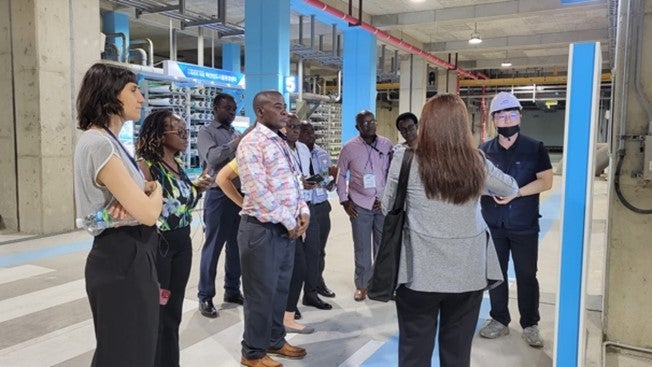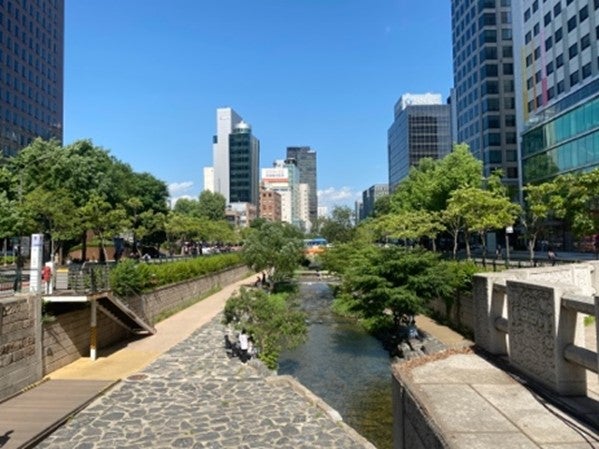 Lake Victoria Basin Stakeholders with K-Water experts
Lake Victoria Basin Stakeholders with K-Water experts
In a world facing numerous environmental challenges, collaborative efforts are crucial to creating sustainable solutions. The Lake-wide Inclusive Sanitation initiative in the Lake Victoria Basin (LVB) is a shining example of such an endeavor. Recently, a group of active stakeholders from the Lake Victoria Basin had the incredible opportunity to embark on a "Knowledge Exchange Visit" to South Korea, hosted by the K-Water and funded by the World Bank through the Korea Green Growth Trust Fund. This blog post recounts their enriching experience and the valuable knowledge gained during their time in South Korea.
The visit commenced with a series of insightful lectures, beginning with an exploration of South Korea's Water and Sanitation Sector Regulatory System and Policies. Participants had the privilege of understanding the regulatory framework that has been instrumental in managing South Korea's water resources effectively. This lecture set the stage for a deeper understanding of the challenges and solutions that could be applied in the Lake Victoria Basin.
The second lecture focused on South Korea's Lake Water Quality and Pollution Source Management. Participants learned about innovative approaches and best practices employed in South Korea to mitigate water pollution and maintain good quality of various water resources. This knowledge holds immense potential for addressing the deteriorating water quality in the Lake Victoria Basin.
Lecture three shed light on the Wastewater Treatment Process and the concept of "One Water." Participants were introduced to advanced technologies and strategies employed by K-Water to ensure efficient wastewater treatment. Of particular interest is the recycling of treated wastewater for industrial use which provides a great example of the “One Water” initiative. Additionally, the Government of South Korea upholds strict effluent discharge standards that help to maintain the health of receiving water bodies. Understanding these processes will help participants implement sustainable sanitation practices and protect the Lake Victoria Basin from further degradation.

K-water’s successful Incubation Program for Water and Sanitation Sector Small and Medium Enterprises (SMEs) was the subject of the fourth lecture. This session provided insights into K-Water’s initiatives that promote the growth of SMEs in the water and sanitation sector, supported by the Government. Participants gained valuable knowledge about nurturing entrepreneurship and encouraging innovation within their own countries.
The exchange visit also included interactive workshops and study visits that facilitated knowledge sharing and practical learning. While South Korea might be at a different stage of development from the East African Countries, there were many insights and lessons to learn on better management of Lake Victoria.

During Workshop #1, participants had the opportunity to present their country's situation on sanitation, learn from each other's experiences and get relevant feedback from the South Korean experts.
Workshop #2 focused on discussing the latest trends and challenges in the water and sanitation sector, fostering collaborative change management.
Workshop #3, involving SMEs representatives, highlighted the technology development and promotion programs for SMEs in the water and sanitation sector. This workshop served as a platform to share success stories and innovative ideas, fostering stronger networks among participants.
Workshop #4 introduced Korea’s water quality tele-monitoring system at Korea Environmental Corporation which is a state agency under the umbrella of the Korean Ministry of Environment along with K-water.
Workshop #5 offered an opportunity to learn about climate finance mechanisms from water resources specialists at Green Climate Fund. Participants had a knowledge for their sketch of business pipeline for Lake-wide inclusive sanitation in Lake Victoria Basin.
The study visits were equally enlightening. Participants explored the Asan New City Sewage Treatment & Reuse Center, gaining insights into advanced sewage treatment and reuse technologies. This visit showcased how South Korea monitors and manages wastewater treatment plants efficiently.
The visit to the Chenggye Stream Restoration Project at Chenggyecheon Museum exemplified successful environmental restoration efforts, inspiring participants to take similar initiatives back to the Lake Victoria Basin.

Amidst the enriching knowledge exchange, participants also had the opportunity to immerse themselves in South Korean culture. A farewell dinner provided the perfect setting for cultural exchange, strengthening bonds among participants and hosts. Short cultural sightseeing activities allowed participants to experience the vibrant heritage and beauty of South Korea first-hand.
The Knowledge Exchange Visit to South Korea proved to be an invaluable experience for the participants. The lectures, workshops, and study visits provided them with the tools and inspiration needed to respond effectively to the deteriorating water quality in the Lake Victoria Basin. Armed with newfound knowledge and a strengthened network, these active participants are now better equipped to contribute to reversing the deteriorating water quality of Lake Victoria while improving the health and dignity of communities living in the participating countries in the basin through the provision of integrated environmental sanitation services.
“The LWIS framework sets the appropriate strategy approach for the restoration and management of the health of Lake Victoria for enhanced economic benefits of the basin communities and Partner States. The visit to South Korea introduced tools, concepts and experience that will be extremely useful for our next steps at the Lake”, Fidelis Kyengo, Director of Sanitation Management, Ministry of Water, Sanitation, and Irrigation in Kenya.




Join the Conversation